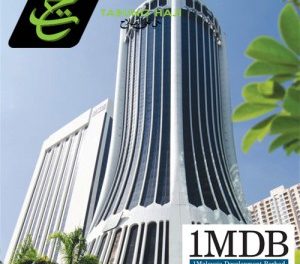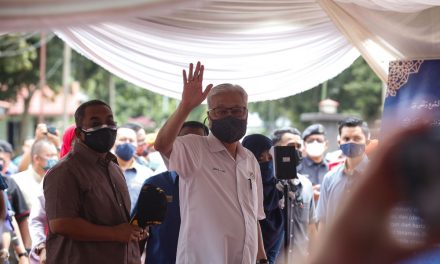Muhyiddin: Action against Covid-19 anti-vaxxers to be announced by next month
The government will announce the action that will be taken against anti-vaccine groups either this month or next month, said Prime Minister Tan Sri Muhyiddin Yassin. He said it was to ensure that the country could achieve herd immunity to curb the spread of Covid-19 transmissions. Muhyiddin however said before any action was taken, the government would first look into the factors that caused someone to refuse to register as a vaccine recipient. “We will study and conduct some research about this (anti-vaccine) group. We need to know the background, whether most of them are so sick that they are afraid to take the vaccine or they don’t want to take the vaccine because they don’t believe (in it),” he said. He also did not rule out the possibility of making it compulsory for each individual to take the vaccine jabs. “It will be decided by the government within this month or next month,” he added. (Malay Mail)
As KL nears 80% vaccinated, minister moots special committee for FT recovery
Federal Territories Minister Tan Sri Annuar Musa has proposed a special advisory committee be formed to aid in the recovery of the Federal Territories. He said the committee will consist of federal lawmakers from Umno, Parti Pribumi Bersatu, DAP, PKR, Dewan Negara Senators, NGOs, corporate figures, among others. “KL needs to make preparations for the third phase of the Covid-19 National Recovery Plan, but in stages. Thus economic activity and the rakyat’s lives can open up,” he said. Annuar added that the city has since reached 78% coverage for the second dose of Covid-19 vaccines, or 1.38 million people. “KL is one of the world’s earliest capitals to achieve this 80% vaccination rate,” he said. As of midnight yesterday, approximately 25,863,563 people have been vaccinated in Malaysia. (Malay Mail)
Perkukuh initiative launched to reform GLICs
Malaysia has unveiled a new direction for government-linked investment firms (GLICs), splitting them into sovereign wealth funds and institutional investors. The former category encompasses Khazanah Nasional Bhd, Kumpulan Wang Persaraan (Diperbadankan) or KWAP, Kumpulan Wang Amanah Negara (KWAN) and Minister of Finance (Incorporated). The institutional investors house the Employees Provident Fund (EPF), Permodalan Nasional Bhd (PNB), Lembaga Tabung Haji (TH) and Lembaga Tabung Angkatan Tentera (LTAT). Prime Minister Tan Sri Muhyiddin Yassin said this move under the Perkukuh Pelaburan Rakyat (Perkukuh) programme was to reflect GLICs unique mandates better, strategies and asset-liability management. The mandate comprises 20 key initiatives with five key objectives to sharpen clarity on the mandate of each GLIC, enhance focus on developmental and catalytical investments to spur new growth and enhance socio-economic impact, as well as crowd-in the private sector while streamlining the role of the government and its agencies in the business. Muhyiddin said the programme would also allow the government to future-proof GLICs with best-in-class governance, capabilities and strategies; and strengthen social safeguards and fiscal resilience. Given the intricacies of each initiative, Muhyiddin said Perkukuh would be implemented on a multi-wave basis – beginning with key initiatives like the “GLIC/GLC 2.0 governance standard”. “All in all, the 20 key initiatives will be implemented through 2024. Perkukuh will create an ecosystem that benefits all stakeholders of the economy,” he said. (NST Online)

Deloitte Malaysia supports reintroducing GST
Deloitte Malaysia has expressed support for the recommendation by the Organisation for Economic Co-operation and Development (OECD) to bring back the goods and services tax (GST) into Malaysia as part of the country’s medium-term fiscal strategy. Deloitte Malaysia indirect tax executive director Senthuran Elalingam said replacing the sales and services tax (SST) with GST will allow the Government to widen its tax base in order to address the fiscal imbalance caused by the pandemic. Widening the tax base, according to Senthuran, is inevitable as he observed that governments across the world have expended significant capital in the fight against Covid-19. “In the medium to longer term, replacing the SST with the GST from a tax policy perspective makes sense. There are significant challenges to widening a single stage tax like the SST. Recent attempts to widen the scope have resulted in a lot of unintended consequences such as multiple levels of tax being paid and confusion on scope… Reintroducing the GST would remove all current challenges faced with the SST and will give the government a lot more scope to widen the base,” he said. However, Senthuran stressed that the timing of the reintroduction of the GST is critical, as it is important that businesses are given time to stabilise post-pandemic before needing to implement new tax systems. Yesterday, Minister in the Prime Minister’s Department (Economy) Datuk Seri Mustapa Mohamed said policymakers should consider reintroducing GST, as recommended by the OECD, when the time is right. (The Edge)
WHO to test three new drugs for Covid-19 treatment
The World Health Organisation (WHO) has announced that it will test three new drugs for COVID-19, which will involve thousands of researchers at more than 600 hospitals in 52 countries. According to a press release issued by WHO, the three new drugs are artesunate, a treatment for severe malaria; imatinib, a drug for certain cancers; and infliximab, a treatment for immune system disorders such as Crohn’s Disease. “Finding more effective and accessible therapeutics for COVID-19 patients remains a critical need, and WHO is proud to lead this global effort,” said WHO director-general Tedros Adhanom Ghebreyesus. In its previous efforts, WHO has tested four drugs, namely remdesivir, hydroxychloroquine, lopinavir and interferon, and the initial results showed that they had little or no effect on hospitalised patients with COVID-19. (The Edge)
KLIA climbs world’s top 100 airports list for 2021
The Kuala Lumpur International Airport (KLIA) has climbed up the global airport ranking amid the pandemic, coming in at 55th place on the annual Skytrax World’s Top 100 Airports list. This is a significant improvement for the country’s premiere gateway after falling to its lowest position at 63rd place last year. The highest ranking KLIA achieved was in 2001, when it took the second spot on the list. The list, however, omitted the award for the World’s Best Low-Cost Airline Terminal this year. KLIA2 managed to stay in the top 10 last year, coming in at number six. Meanwhile, for the the first time in nearly a decade, Singapore’s Changi Airport has fallen from its perennial spot at the top of the list to land in third place. The iconic airport passed on the number one spot to Doha’s Hamad International Airport, which has consistently climbed the ranks over the years. (The Star)
The top 10 World’s Best Airports:
- Hamad International Airport
- Tokyo Haneda Airport
- Singapore Changi Airport
- Incheon International Airport
- Tokyo Narita Airport
- Munich Airport
- Zurich Airport
- London Heathrow Airport
- Kansai International Airport
- Hong Kong International Airport





